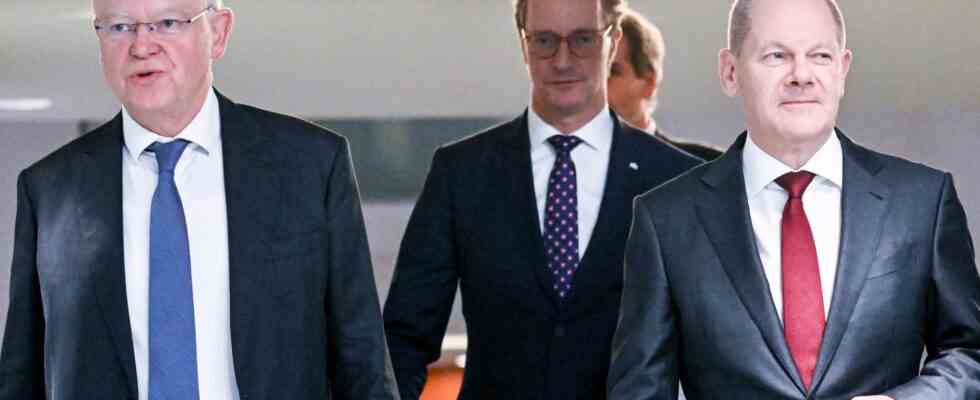Status: 10/04/2022 10:26 p.m
The financing of billions in savings in energy costs remains controversial between the federal and state governments. A meeting of several hours between Chancellor Scholz and the country heads did not result in an agreement. After all, there is a commitment from the federal government.
How are the costs to be shared that are due to relieve citizens and companies in order to help them in the energy crisis? The federal and state governments could not find a consensus on this question. “There are still discussions about how this can be shouldered in detail,” said Chancellor Olaf Scholz (SPD) after the consultations with the prime ministers.
“But I have the impression that we are on a very constructive path and that we will also come to an agreement about this task.” All participants wanted a solution that works, says Scholz and praised the factual tone.
“In any case, it was decided that we wanted to continue talking to each other,” Christoph Mestmacher, ARD Berlin, on the results of the federal-state meeting
tagesschau24 9:30 p.m., October 4th, 2022
The federal government will shoulder 240 billion euros
Scholz calculated that the previous relief packages and the special fund now planned will have a total volume of 295 billion euros. “The federal government will take on and finance almost 240, 250 billion euros of this,” said the Chancellor. According to him, the concrete design of the planned electricity and gas price brake is still being discussed.
The federal government wants to protect consumers and companies from high energy prices due to the Ukraine war with a package of measures worth up to 200 billion euros. Gas and electricity prices should be capped. There should be liquidity and equity support for companies. Details are still open. The aid is to be financed through loans.
Because: Keep working towards agreement
The consultations also included a solution to replace the 9-euro ticket for local and regional transport that expired at the end of August. Local public transport customers are still not sure whether and when there will be a nationwide successor model. The federal and state governments were unable to agree on financing issues during their deliberations. The federal government rejected demands from the states for more money for local transport in general.
One must continue to work on an agreement, said the chairman of the Prime Ministers’ Conference, Lower Saxony’s Prime Minister Stephan Weil, after the deliberations. The 9-euro ticket has brought considerable relief in urban areas, but not in many rural areas where there is not such a good offer.
Wüst: It’s the federal government’s turn
Weil said that “specific decisions have not yet been made” on how the burdens would be shared between the federal and state governments. Rather, the meeting was an intermediate stage. The SPD politician says he expects a decision to be made at the end of the month or in early November.
North Rhine-Westphalia’s Prime Minister Hendrik Wüst was clearer after the deliberations. He was disappointed. The results of the meeting were “not enough,” said the CDU politician. There are “a whole lot of unanswered questions” that the federal government must answer.
The countries are ready to share the burden. But there must be a fair sharing of the burden, the federal government is on the train here, emphasized the NRW head of government. This applies not only to the energy costs, but also to the reception of refugees, especially from the Ukraine.

